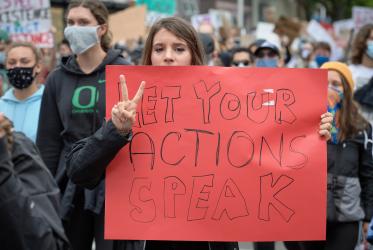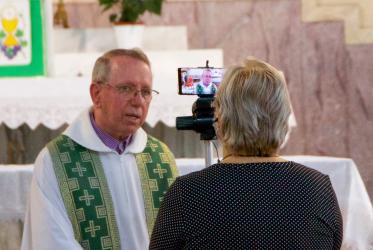Thanks to the great arc of the Carpathian Mountains, the Danube and the Black Sea, Romania is easy to find on any map. Culturally speaking it lies at the cross-roads between eastern and western Europe. Ninety-nine percent of its population of just over 22 million people call themselves Christian. As regards other communities of faith, there are 9,000 Jews and 56,000 Muslims. A few thousand people declare themselves to be atheists or of no faith.
The largest church is the Romanian Orthodox Church, to which 86.8% of Romanian Christians belong (19.8 million people). The Roman Catholic Church (5%) has 1.16 million members, while the Greek Catholic Church claims something over 700,000 The Reformed Church has 800,000 members, the Evangelical Lutheran Church 21,000, the Evangelical [Lutheran] Church of the Augsburg Confession, 17,000. The Unitarian community has some 76,000 members, the Armenian Church 2,000, while the free churches - Baptists, Pentecostalists, Adventists, Evangelicals and others - number over half a million Christians.
The Ecumenical Association of Churches (AIDRom) was founded in 1993 and includes the Orthodox, the Reformed, the two Evangelical [Lutheran] churches and the Armenian Church. AIDRom maintains contact with international ecumenical partners and with NGOs and associations in Romania, whose projects it helps carry out. One concern of the Ecumenical Association of Churches is the Week of Prayer for Christian Unity, for which AIDRom produces a leaflet every year in three languages (Romanian, Hungarian, German), using the material produced by the international preparatory group and sent by the WCC, to encourage and assist with ecumenical worship services throughout the country.
The Week of Prayer for Christian Unity has been celebrated in some places since the 1960s. Another occasion for ecumenical services is the [Women’s] World Day of Prayer, which is observed on the first Friday in March every year. Preparations for this are coordinated by a country-wide ecumenical committee with women from seven churches, including the Roman Catholic Church. The Romanian World Day of Prayer Committee also has the exceptional responsibility of preparing the order of prayer for the World Day of Prayer on 1 March 2002.
In 1990, it once again became permissible to form associations and many Christian associations, both confessional and ecumenical, were founded. In Bucharest, the Interconfessional Bible Society in Romania is at work. 1992 saw the founding of the "Ecumenical Forum of Christian Women in Romania", to which Christian women’s associations and individuals belong. The Forum organizes ecumenical meetings and training courses which are attended by women from all over the country. An example of local ecumenism is the aid association "Ortopraxia" in Orastie/Broos. It is run by the parishes of the five historical churches present in the town. Other organizations also work ecumenically, even though they are attached to a particular confession, like the association known as "Lifebelt" run by the Reformed congregation in Tirgu Mures.
Ecumenical relations are maintained among the different churches at the level of church authorities and theological faculties within the country, and in the form of partnerships between churches here and churches abroad. The Protestant churches are members of their respective world organizations (e.g. Lutheran World Federation, World Alliance of Reformed Churches, Baptist World Alliance) and, like the Romanian Orthodox Church, are also members of the Conference of European Churches and the World Council of Churches.
A look at the past
The beginnings of Christianity on the territory of what is today Romania reach back to the earliest times, according to Orthodox tradition, to the first century of the Christian era. Archeological finds confirm Christian life in the 4th century. To give a few historical facts: a Roman Catholic bishopric was set up in Alba Iulia (Transylvania) in the 11th century ; in 1359 an Orthodox metropolitan see was founded in Arges for Wallachia. The Romanian Orthodox Church became independent in 1885 and in 1925 was elevated to the rank of patriarchate. In Transylvania, where many churches are established, tolerant and exemplary legislation came into force at a remarkably early date (1568). Various confessions were recognized and given equal status so that Austrian Protestants, for example, were able to find refuge in Transylvania.
The diversity of churches to be found in Romania and, above all, in Transylvania stems partly from the ethnic origin of the inhabitants. Broadly speaking, Romanians belong to the Orthodox Church and the Catholic churches of both rites; Reformed, Unitarians, a majority of Roman Catholics and some Lutherans are of Hungarian origin, living mostly in Transylvania. The members of the Evangelical Church A.C. belong mainly to the German minority in Transylvania. The country’s diversity is an enrichment of its life, but coexistence calls for a great deal of mutual understanding. It is important that everyone should work for reconciliation.
Under the communist dictatorship (from the end of World War II to 1989), all the churches were in a difficult position. They lost almost all the land, forests, schools, hospitals and buildings left in their possession after the agrarian reform of 1921 (except the churches). No new church buildings could be erected. Religious instruction was banned in schools (though not in the churches). Training institutions for pastors did continue to function, though with some restrictions. The Greek Catholic Church suffered particularly harsh treatment at the hands of the communist regime. It was totally banned, its clergy imprisoned or killed, its property confiscated, its church buildings taken away and handed over to the Orthodox Church.
On the threshold of the new millennium
The political upheaval of 1989 brought new openings and opportunities for the churches too. Freedom of movement and assembly and a free press are also good for ecumenism. The former "solidarity of the oppressed" has faded, but the spontaneous openness to dialogue has made new forms of cooperation possible.
The churches are conscientiously fulfilling their diaconal tasks and working to help the weak and marginalized. This is absolutely essential in a country facing enormous economic problems and growing poverty. But they must also minister to spiritual needs. In the last ten years over 100 new Orthodox monastery churches have been built in Romania. Indeed, the monasteries generally are flourishing and undergoing a period of great outreach.
The Greek Catholic Church is still struggling to recover its former property, as in many places its congregations - much reduced after the 45-year ban on its existence - have still not had all their churches returned (so far only about 120 of the more than 2,300 church properties of 1948). For other churches too, ten years after the political changes, the situation regarding ownership of buildings (e.g. schools, homes, etc.) has still not been clarified.
Religious instruction in schools has been reinstated and parents can choose which course, i.e. given by which confession, they wish their child to attend but, despite this, there are still accusations in some places of unfair attempts to recruit members. Proselytism is also suspected when certain churches use the material strength they have (thanks to foreign partners) to provide aid or undertake large building projects.
An important occasion for the ecumenical community in Romania was Pope John Paul II’s visit to the country on 7-9 May 1999. This was not only a great honour for Romania, but a unique opportunity for intensive reflection on Christian unity. The Orthodox, Greek Catholic and Roman Catholic services held with the participation of the Pope and the Patriarch, or in their presence, made a deep impression on all the worshippers, whatever their confession.
Three successful examples of ecumenical life in Romania, showing friendship and cooperation among people of different churches and different ethnic origins, are:
- Sibiu: An ecumenical service is held every month, attended by members of the Orthodox, Roman Catholic, Greek Catholic, Evangelical and Reformed churches.
- Timisoara: The ecumenical service for the World Day of Prayer is organized centrally, in three languages. People from five churches pray together.
- Bucharest: The Week of Prayer for Christian Unity is prepared by the local ecumenical council of the city. The services are held in a different church in turn each evening and are always attended by an ecumenical congregation.
This description of the ecumenical situation in Romania was presented by the Ecumenical Association of Churches AIDRom (Bucharest), with the approval of its president, Bishop Nifon (Romanian Orthodox Church) and the vice-president, Bishop Christoph Klein (Evangelical Church of the Augsburg Confession in Romania) and in consultation with representatives of the Roman Catholic . The information about the churches and ecumenical life in Romania was prepared at the request of the international preparatory group, for inclusion in the brochure for the Week of Prayer for Christian Unity 2001.

